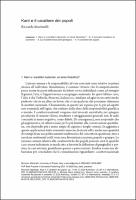Chapter Kant e il carattere dei popoli
| dc.contributor.author | MARTINELLI, RICCARDO | |
| dc.date.accessioned | 2022-06-01T12:16:43Z | |
| dc.date.available | 2022-06-01T12:16:43Z | |
| dc.date.issued | 2020 | |
| dc.identifier | ONIX_20220601_9788855181600_403 | |
| dc.identifier.issn | 2704-5919 | |
| dc.identifier.uri | https://library.oapen.org/handle/20.500.12657/56220 | |
| dc.description.abstract | Kant deals with national characters in the second part of his Anthropology from a pragmatic point of view of 1798. Firmly rejecting the climatic theory, he advocates an anti-naturalistic stance. However, Kant is skeptical of Hume’s tenet that nations owe their characters to their different forms of government. In Kant’s view, the most civilized nations are England and France: their characters have to do with purely cultural factors. Complementing each other, the characters of those nations broadly correspond to a masculine and feminine principle, as analyzed by Kant in the previous chapter of his Anthropology. The remaining European and Extra-European nations have a less defined – and, in some cases, mixed – character, that owes something more to the natural dispositions. Yet Kant still manages to avoid naturalistic explanations. In many nations, natural dispositions do prevail over cultural ones, but this simply means that less (and sometimes, nothing) can be said about their characters. | |
| dc.language | Italian | |
| dc.relation.ispartofseries | Studi e saggi | |
| dc.subject.other | Immanuel Kant | |
| dc.subject.other | Pragmatic Anthropology | |
| dc.subject.other | National Characters | |
| dc.title | Chapter Kant e il carattere dei popoli | |
| dc.type | chapter | |
| oapen.identifier.doi | 10.36253/978-88-5518-160-0.05 | |
| oapen.relation.isPublishedBy | bf65d21a-78e5-4ba2-983a-dbfa90962870 | |
| oapen.relation.isbn | 9788855181600 | |
| oapen.series.number | 214 | |
| oapen.pages | 14 | |
| oapen.place.publication | Florence |

